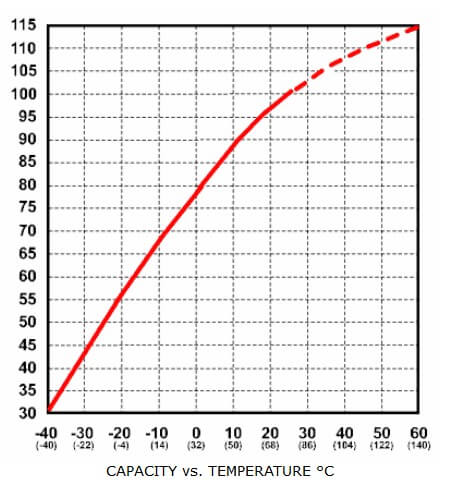What is car battery reserve capacity
What is car battery reserve capacity?
Automotive batteries are rated in three categories: cold cranking amps, cranking amps and reserve capacity. I’ll cover cold cranking amps, cranking amp in this post and concentrate on just reserve capacity here.
Automotive battery reserve capacity is a rating to  give you an idea of how long the battery can be discharged at a rate of 25-amps while still maintaining at least 1.75-volts per cell, or 10.5 total volts. A 12-volt battery is capable of outputting 2-volts for each of the six cells. The capacity is measured at 80°F. So a battery with 100 RC rating is capable of providing 25-amps for 100 minutes. Since a lead acid battery works by way of a chemical reaction and chemical reactions slow in colder temperatures, you’ll get less capacity time than the stated reserve capacity in cold weather.
give you an idea of how long the battery can be discharged at a rate of 25-amps while still maintaining at least 1.75-volts per cell, or 10.5 total volts. A 12-volt battery is capable of outputting 2-volts for each of the six cells. The capacity is measured at 80°F. So a battery with 100 RC rating is capable of providing 25-amps for 100 minutes. Since a lead acid battery works by way of a chemical reaction and chemical reactions slow in colder temperatures, you’ll get less capacity time than the stated reserve capacity in cold weather.
Why do you care about reserve capacity?
It used to be important only for deep cycle applications like a battery used for an electric trolling motor. But it’s has much more importance  in automotive applications now because of all the electrical accessories owner plug into the power ports.
in automotive applications now because of all the electrical accessories owner plug into the power ports.
If your kids are running phone chargers, video players or game consoles while the engine is off, they’re draining the reserve capacity of the battery.
It’s temperature and discharge dependent
As you can see in this chart, reserve capacity falls as the temperature goes down. But reserve capacity is also affected by the rate of discharge. As I mentioned above, a battery’s reserve capacity is based on discharging at a rate of 25-amps. But Peukert’s law states that a battery’s reserve capacity falls faster as the rate of discharge increases. So it’s not a linear rate. Draw more amps and you’ll run the battery down at a faster rate. To use the example above, if you use the same battery at the same 80°F temp, but draw 50-amps instead of 25-amps, you won’t get 50 minutes of power. The battery will drain at a faster rate due to the higher current draw.

©, 2017 Rick Muscoplat
Posted on by Rick Muscoplat
